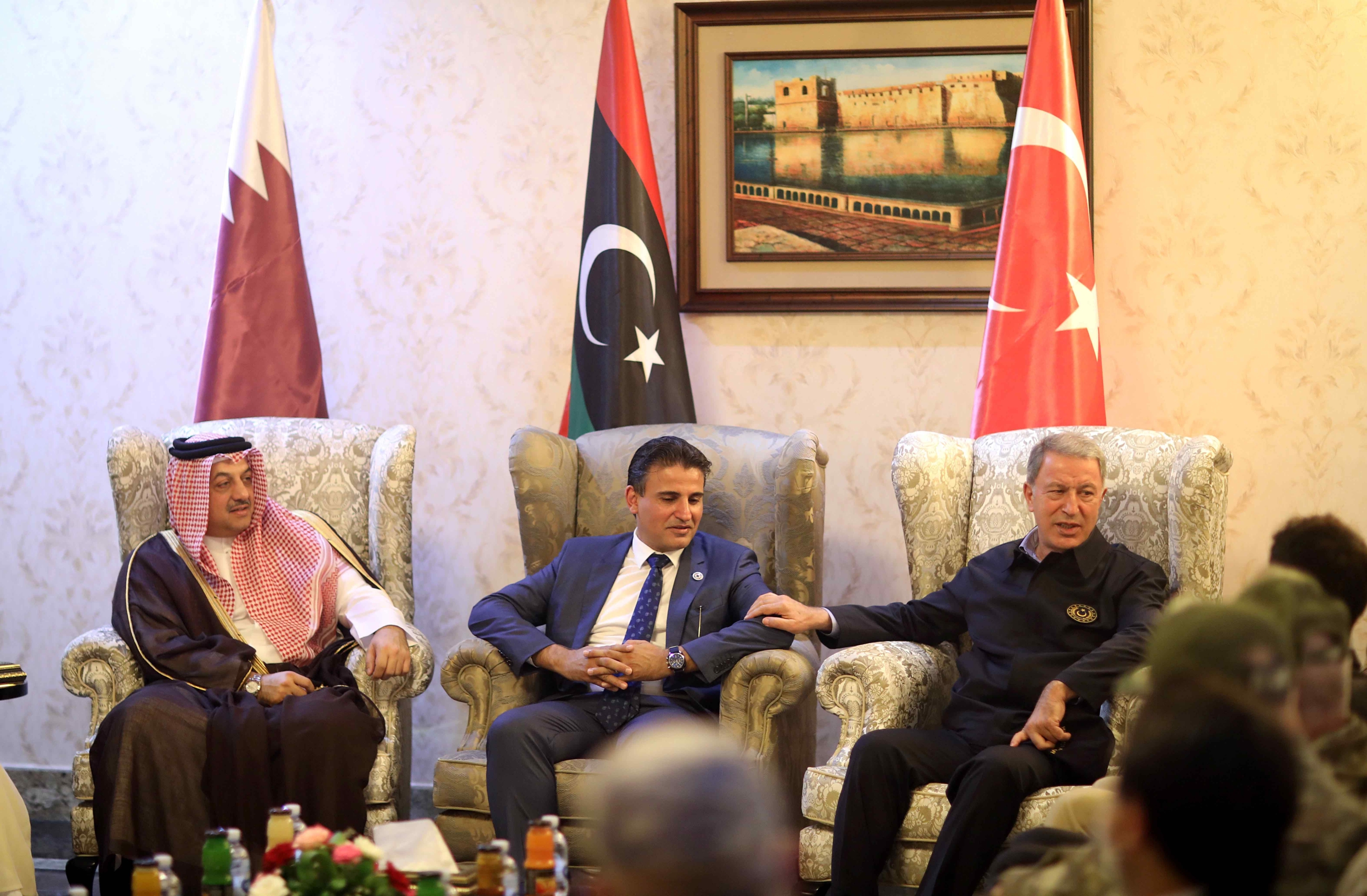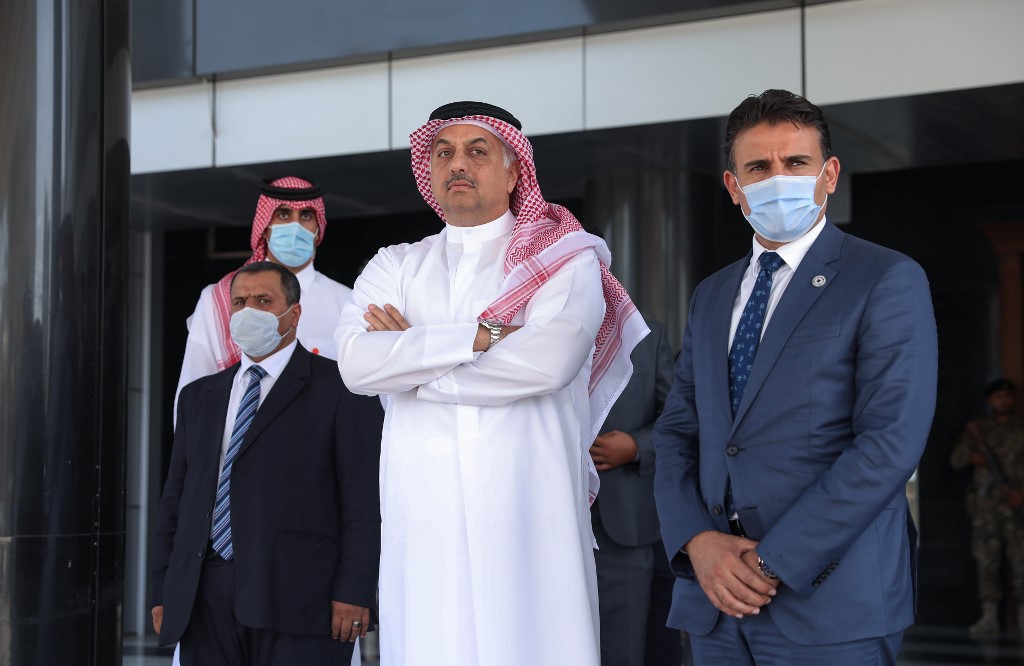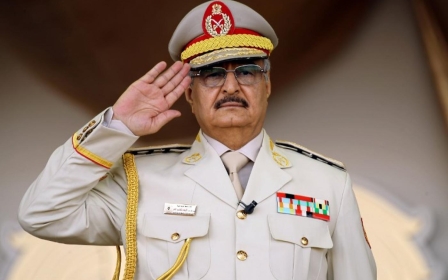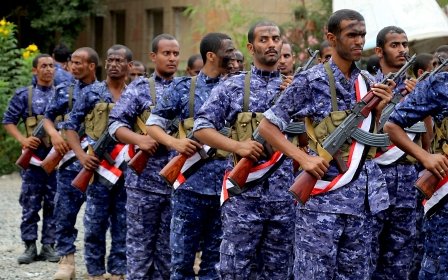In Libya, Turkey and Qatar deepen their footprint amid deadlock in negotiations

The Turkish government has strengthened its involvement in Libya by signing a protocol with the Tripoli-based Government of National Accord (GNA) and Qatar earlier this week, establishing a tripartite coordination centre for military training and cooperation.
Turkish media has reported that the new protocol would enable the Turkish military to organise and train a new regular army for the GNA, thereby dissolving disorderly militia and bringing a new order to the chaotic world of armed groups in the country, deemed a major problem by western powers.
Stay informed with MEE's newsletters
Sign up to get the latest alerts, insights and analysis, starting with Turkey Unpacked
Daily newspaper Yeni Safak described the effort as similar to what Ankara did in 1993 with newly independent Azerbaijan, which at the time lacked a regular and modern army.
A Turkish source with knowledge of the agreement told Middle East Eye that there were already dozens of Libyan soldiers undergoing training in Turkey, and that such an initiative wasn’t new.
However, the establishment of a trilateral coordination centre in Misrata between Turkey, Qatar and the GNA suggests Qatar is also now going to officially help the internationally recognised Libyan government to strengthen its defences against the rival Benghazi-based Libyan National Army (LNA), led by renegade general Khalifa Haftar.
Even though Qatar has been rumoured to fund many Turkish efforts abroad - including the deployment of Syrian rebels trained by Turkey to the country - Doha has always taken a back seat.
Turkish naval base in Misrata
Turkish and Arab media have speculated that the recent accord would also provide a naval base for the Turkish military in Misrata, as has been reported several times in the past.
Turkish officials earlier this year confirmed to MEE that they were in talks with the GNA to use some of the bases in Libya, including the strategically located al-Watiya airbase.
Turkey and the GNA signed a memorandum of understanding in November to delimit maritime zones in the eastern Mediterranean, in an attempt to block further Greek and Cypriot energy-drilling activities in the area.
Despite a UN embargo on sending weapons to Libya, Turkey signed a military cooperation deal with the GNA and had sent drones, armoured vehicles, Syrian mercenaries and military officers to support its efforts to fight off Haftar's offensive to capture the capital Tripoli that began in April 2019.
The GNA went on to score a series of victories against the LNA - including the seizure of the al-Watiya airbase - which has seen the eastern commander's yearlong offensive in western Libya crumble and Tripoli under full GNA control by June.
Neighbouring Egypt, which backs the LNA, declared in June that the cities of Sirte and Jufra were a red line that should not be crossed, threatening to take action should the GNA pursue its efforts to seize them.
Ibrahim Kalin, chief foreign policy adviser to Turkish President Recep Tayyip Erdogan, said earlier this week that Turkey, in principle, was open to a German proposal to demilitarise Sirte and Jufra if the LNA met some preconditions.
GNA's three conditions
A CNN Turk report, citing anonymous sources, said on Tuesday that the GNA had three conditions: that Haftar not be part of the future of Libya; that the private Russian Wagner paramilitary group and other mercenaries leave the country; and that Sirte and Jufra be guarded by GNA forces.
'The GNA might deploy police forces to the area just to provide security'
- Turkish official
A Turkish official involved in the case told MEE that Berlin still hadn't delivered the content of its demilitarisation draft to the parties, and that everything about the proposal was still premature. “However, the GNA might deploy police forces to the area just to provide security,” the official said.
Negotiations between Turkey and Russia on the subject continue slowly, even though Moscow has sought to establish an Astana-like process to declare itself as one of the main sponsors of the political negotiations.
One knowledgeable source told MEE that Russian had offered a deal to keep Sirte and Jufra in their hands in exchange for a tangible concession in the eastern Mediterranean.
“They said they would convince Haftar not to sign a rival maritime delimitation deal with Greece," the source said. "However, no one in Ankara even considered it. ”
Haftar lifts oil blockade
Meanwhile, earlier this week Haftar ordered the removal of a months-long blockade on oil production facilities due to increasing US and European pressure.
“Haftar gave the order to reopen ports and facilities in order to end the problems experienced by Libyans in many areas of life and to protect the infrastructure of the oil production and export facilities,” Naji al-Maghribi, the head of Libya’s Petroleum Facilities Guards, was quoted as saying.
'It was the introduction of the Wagner forces and large-scale military hardware last fall that completely destabilised the situation in Libya'
- US Ambassador to Libya Richard Norland
Libya has the largest reserves of oil in Africa, with a daily potential production of 1.2m barrels of crude oil - but since the blockade, production has significantly diminished.
US officials, angered by the increasing Russian military presence in Libya, have been also pushing Haftar to accept the German proposal on Sirte and Jufra and return to political negotiations.
US Ambassador to Libya Richard Norland last week paid a visit to Ankara and met with senior Turkish defence officials to discuss the ongoing Libyan crisis.
“It was the introduction of the Wagner forces and large-scale military hardware last fall that completely destabilised the situation in Libya and led to the arrangement by which Turkish forces intervened,” Norland told Turkish newspaper Hurriyet earlier this week. "So those who are unhappy about the presence of Turkish forces in Libya should ask themselves why they supported and engaged with Wagner in making that deployment last fall by the Russians.”
The tangible American support expected by Ankara, however, hasn't been forthcoming.
US President Donald Trump told his Turkish counterpart earlier this month that he wasn’t willing to overtly support Turkey in Libya due to November's US presidential elections.
“They [the US] keep criticising Russian involvement, but stay silent about French support for Russians in Libya,” another Turkish official told MEE, noting recent tensions between Paris and Ankara over the issue. “They need to seriously be involved to help resolve this crisis.”
Middle East Eye delivers independent and unrivalled coverage and analysis of the Middle East, North Africa and beyond. To learn more about republishing this content and the associated fees, please fill out this form. More about MEE can be found here.






